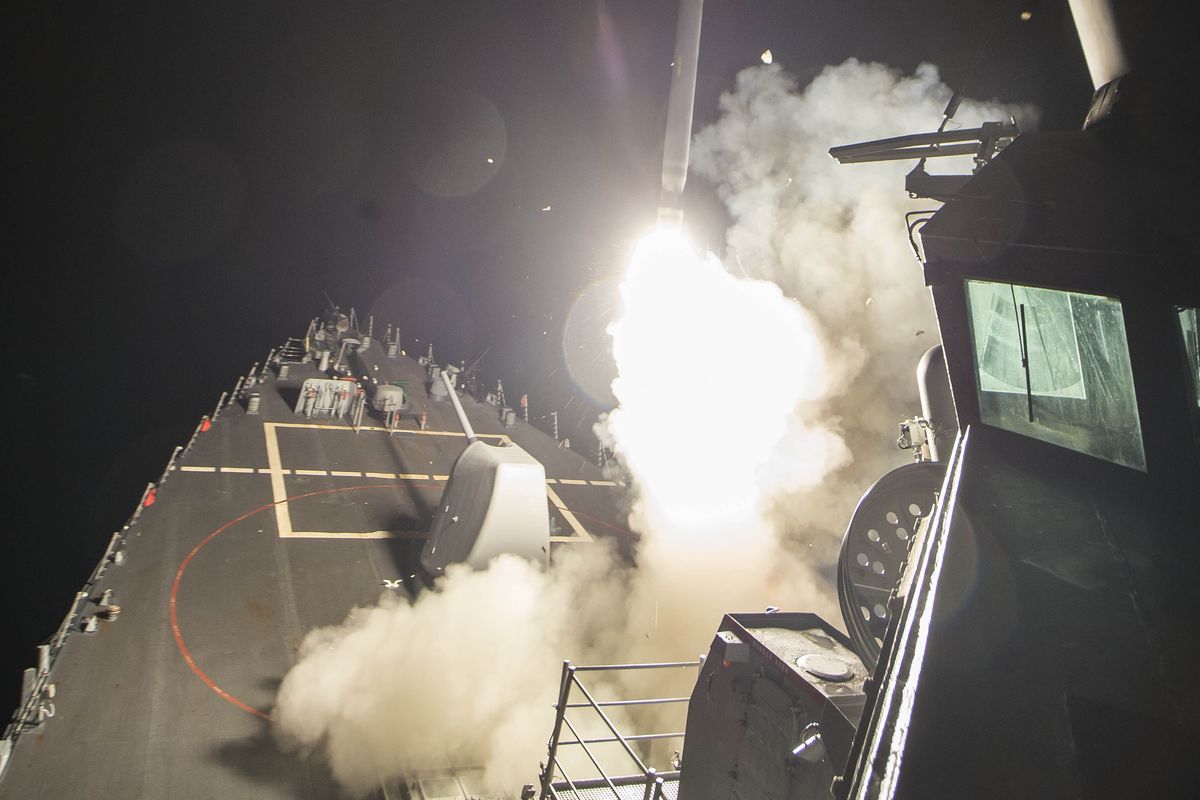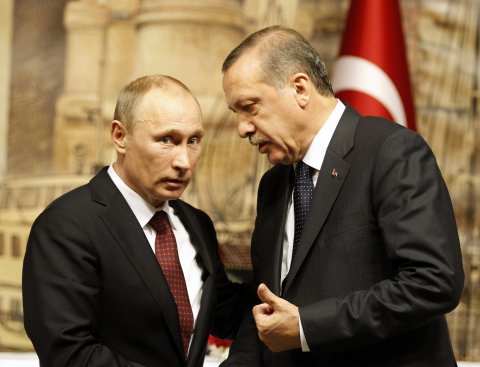Turkey has welcomed the American military action against the Syrian regime — a move that it long clamored for — but said it is not enough, the country’s president said on Friday.
As the world still makes a sense of the ramifications of the U.S. missile attack against an airbase used by the Syrian regime for a chemical attack that killed scores of people this week, Turkey offered a measured response, a cautious embrace of the action.
“Tonight, I ordered a targeted military strike on the air base in Syria from where the chemical attack was launched, U.S. President Donald J. Trump told media on Thursday night.
“It is in this vital national security interest of the United States to prevent and deter the spread and use of deadly chemical weapons,” Mr. Trump said, heralding a new chapter of U.S. entanglement in one of the vicious and protracted civil wars in the Middle East region.
The Pentagon said 59 Tomahawk cruise missiles were fired at Al Shayrat air base in Syria.
Mr. Trump’s stunning order represents a dramatic turnaround from his longstanding view of the Syrian conflict, given that he often defended a hands-off approach, avoiding a lurch into an uncharted territory. Just last week, Mr. Trump talked about the content with seeing Syrian President Bashar al-Assad in power.
For Turkey, which had long pressed for a robust international action to arrest the Syrian carnage that killed half a million people and displaced almost half of the country’s 22 million population, the American action is long overdue but seen a welcoming move.
Turkish Deputy Prime Minister Numan Kurtulmus said Turkey views the operation positively.
“This is a very cruel war. It was proven that the chemical weapons had been used before. But there was no strong reaction [then]. This is not the first [attack],” Mr. Kurtulmus said in lamentation about the international inertia that reigned after previous rounds of chemical attacks. But Turkey welcomes the American strike, he emphasized.
Speaking at a campaign rally in the southern province of Hatay on Friday, President Erdogan, an avowed and outspoken opponent of Syria’s al-Assad, said Turkey backs any attempt to act against the Assad regime which he said committed countless atrocities with both conventional and chemical weapons.
He reminded the crowd that Idlib, where the sarin gas attack took place, is only hours away from Hatay, a Turkish border province that shouldered most of the refugees in Turkey and is deeply affected by the spillover of the Syrian conflict.
Mr. Erdogan, however, cautioned that the strike is not enough, demanded a comprehensive action to end the carnage in Syria.
He has again pledged Turkish support for international action. On Thursday, he vowed to give Turkey’s backing if Mr. Trump took a military action against Syria.
President Erdogan who was never shy about displaying his exasperation with the inability of the international community to stunt the Syrian bloodshed appeared demanding after Mr. Trump’s Wednesday vow that the U.S. would consider a military action in Syria.
“I thank him, but it should not remain unfulfilled,” President Erdogan told a Turkish TV channel on Thursday when asked about Mr. Trump’s remarks. And less than a day after his TV call, the American president moved to match his vow with deeds and action.
Building a safe zone in Syria had long been a central staple of Mr. Erdogan’s Syria policy to place some of the 3 million refugees Turkey hosts in refugee camps in a secure area in northern Syria.
A chemical attack widely believed to be carried out by a Syrian airstrike rattled the entire world, exposing the utter impotence of the leading international powers which were even unable to come up with a condemnation at the United Nations Security Council.
Russian intransigence against drafting a resolution condemning the attack proved to be a tipping point for a dysfunctional council, prompting U.S. Ambassador to the United Nations Nikki Haley to announce that the U.S. would take a unilateral action if the U.N. fails.
“When the United Nations consistently fails in its duty to act collectively, there are times in the life of states that we are compelled to take our own action,” she said. “For the sake of victims, I hope the rest of the council is finally willing to do the same.”
“How many more children have to die before Russia cares?” she expressed her outrage for the Russia’s muted reaction against the latest atrocity.
The U.S. has not excluded a military response to a poison attack which Washington blamed on the Syrian government, a senior administration official told Reuters on Thursday.
After the attack on Friday, Ms. Haley told the United Nations Securit Council that the U.S. took “a very measured step,” and is prepared to do more.
Turkey’s president has long craved to persuade its allies to get on board for the creation of a secure zone for civilians. It was a seminal moment of disappointment for Mr. Erdogan when former U.S. President Barack Obama abruptly overturned his decision to strike Syria after Mr. Assad’s forces carried out a brazen chemical attack in suburbs of Damascus in 2013.
A year before, in 2012, Mr. Obama had designated use of chemical weapons as a red line not to be crossed and vowed to strike regime forces if that line violated. But when it happened in 2013, he revamped his position after Damascus agreed to transfer its chemical weapons arsenal to international powers in a deal brokered by Russia.
In his initial reaction to the Tuesday’s attack, Mr. Trump also cited Mr. Obama’s decision, laid the blame on the former U.S. president for failing to honor his pledge four years ago.
It is still far from clear that how far Mr. Trump’s administration would go and whether the U.S. would seriously contemplate Turkish plans for a safe zone.
But Mr. Trump’s remarks after the missile strike suggested a limited U.S. military action only to deter further aggression and use of chemical weapons by the Syrian regime.
The attack drew sharp condemnation from the Syrian regime which described the American strike as “a reckless and irresponsible act.”
A statement from President Assad’s office said the attack has only increased Mr. Assad’s resolve to “continue crushing” rebel groups.
The American move drove a wedge between the U.S. and Russia which condemned the strikes.
********
This article was possible thanks to your donations. Please keep supporting us here.























